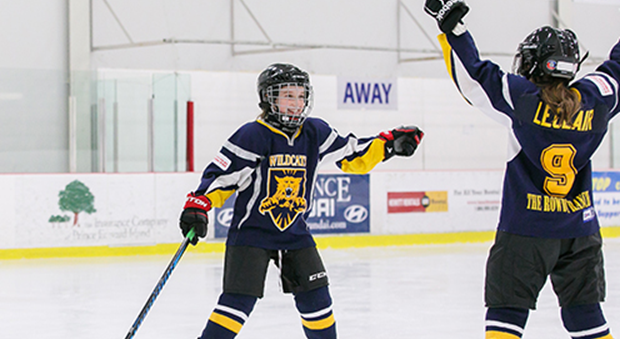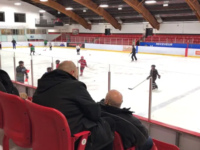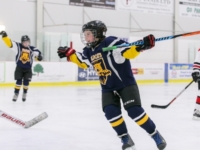The most successful hockey teams at any age or skill level are full of “team players.”
A “team player” is someone who looks out not only for themselves, but for everyone on their team. They work hard and inspire everyone around them to work hard as well. They support, encourage, and communicate with their teammates. The ultimate goal of a team player is to see everyone on the team improve their skills and work together to crush the competition.
In hockey, team players are invaluable, but they unfortunately aren’t that common, at least until you get to the upper age and skill levels. Even then, not everybody in the NHL is as good at working with a team as they should be.
However, becoming a “team player” isn’t too difficult. It only involves changing a few things about your mindset and your approach to the game. Here are 8 ways to be a good team player in hockey:
Communicate
Communication is the most important aspect of being a “team player.” After all, if you aren’t communicating with your teammates, you might as well be playing alone. Team players need strong communication both on the ice and off the ice.
On the ice, communicate with your eyes by constantly looking at other players for puck position and to determine how the play is going to unfold. Communicate with your stick by pointing your teammates toward areas on the ice or by having it ready to receive a pass to let them know you’re open. Communicate with your voice by shouting directions to your teammates and letting them know if you’re open. Overall, avoid playing silent hockey. Always keep communication in mind!
Off the ice, talk to your teammates about what you think they did well and what you think they could improve. Discuss plans for future games and practices. When communicating off the ice, listening is just as important as talking—make sure everyone is participating in the conversation. Effective off-ice communication often means the difference between a winning team and a losing team.
Show Commitment and Passion
Another part of being a team player is your ability to show your team that you want to work with them to become better hockey players.
Show your teammates your passion for hockey by talking to them about games, strategy, skill development, work-out routines—basically anything that will get everyone excited to give their all during the next practice and game.
Show your teammates your commitment to the team by showing up on-time, attending as many games and practices as possible, completing every drill properly, and not giving up until your coach dismisses you or the final whistle is blown.
Be Respectful
One of the most important factors for creating a positive, happy team environment is showing respect.
In hockey, you can show respect for your teammates by:
- Being polite and kind (using your manners)
- Using empathy to understand how your teammates feel
- Supporting your teammates’ ideas
- Being honest with your teammates
- Avoiding insulting or belittling people
- Giving your teammates positive encouragement and feedback
Showing respect doesn’t mean you can’t joke around with your teammates and play pranks from time to time. Just remember to always put respect first. If you think a teammate won’t appreciate a joke or a comment, keep it to yourself.
Be Reliable
One of the clearest signs of being a team player in hockey is whether your teammates can rely on you.
To build reliability with your teammates, make sure you cooperate while on the ice. Pay attention to the positioning of your teammates, always try to be open for a pass if needed, and make a lot of passes, yourself. In general, the more you communicate with your teammates during a game, the more reliable you’ll be.
Off-ice, you should try to talk often with your teammates about how they feel about recent practices and games, and how they feel they’re progressing as players. This type of communication builds trust—your teammates will feel that they can rely on you by sharing their ideas, feelings, and concerns.
Set a High Standard
One of the easiest ways to be a team player in hockey is to simply work hard. If your teammates see you working as hard as you can during practices and games, they’ll likely follow suit.
Always show up on time. Always pay attention during practices. Whenever you’re doing a drill, give it your all. Whenever you’re playing a game, always hustle no matter how far ahead or behind your team is. Be the first one on the ice and the last one to leave.
Make sure there’s no room for slacking. If you see one of your teammates fooling around or not giving it their all, politely let them know. If you always try to set a high standard, the rest of your team will try harder to meet that standard. If everyone is working harder, your team will win more games.
Encourage Your Teammates
A little encouragement goes a long way!
You’d be surprised at how much of a difference it can mean for a teammate if you tell them that they did a good job or that you’re proud of them for how hard they worked. Encouragement provides motivation that the rest of your team will use to work harder in the future. Plus, the more you encourage your teammates, the more they’ll encourage you back. Suddenly, practices and games will be an incredibly positive environment that gets everyone excited and motivated to win games and become better hockey players.
You can encourage your teammates by:
- Cheering for them when they score
- Telling them that they have the skills to accomplish their goals
- Giving them compliments
- Keeping a positive attitude and being hopeful
Offer Help and Advice
Everyone on a hockey team has their own unique set of skills that they bring to the table. Some players can skate faster than others, some players can shoot better than others, and some players are better at observing and leading than others. Whenever you see a teammate struggling with something that you’re skilled at, politely offer some help or advice.
By “help,” I don’t mean simply tell them they need to improve—make sure you always have a suggestion whenever you give constructive criticism. For example, if you notice a player struggling with balance while skating, suggest that they keep their feet further apart when striding to create a wider base of support.
Of course, your coach should catch most of the players’ weaknesses, but if you ever notice something you think you could help with, don’t hesitate to step in and offer some friendly advice. You don’t need to be the team captain to give suggestions! This will create an environment where everyone on the team is trying to help each other improve.
Stay Humble
If you’re going to dish out advice to your teammates on how they can improve their technique, then you need to be ready to take some advice, too!
The final tip on how to be a team player is to stay humble. Remember that even though you have your own strengths as a hockey player, there’s always something that someone else can do better than you. Listen to your teammates’ advice if they have any, and make sure to thank them for it. In fact, a good habit to develop is to outright ask your teammates how they think you did and if there’s anything you can improve.
As soon as you start putting the items on this list into action, you should see an improvement not just in your own attitude and skills, but those of your teammates, too! Being a team player is crucial for creating a team environment where everyone feels comfortable, happy, and motivated to work as hard as they can.
It might take some time to get everyone on board but do your best to encourage your teammates to be team players, too. The more players that are committed to improving the team, the more success you’ll have out on the ice!






